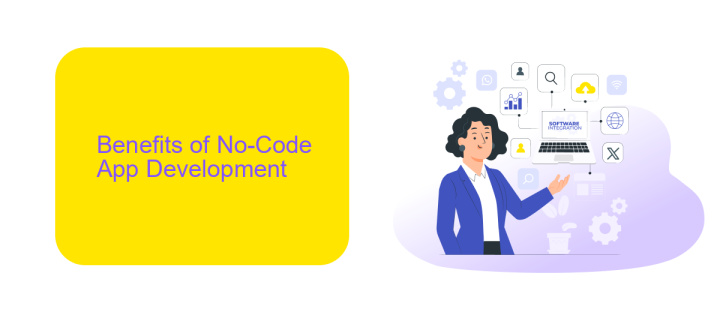No-Code App Development
No-code app development is revolutionizing the tech landscape by empowering individuals without programming skills to create fully functional applications. This innovative approach leverages intuitive visual interfaces and pre-built templates, enabling rapid development and deployment. As businesses and entrepreneurs seek cost-effective and efficient solutions, no-code platforms are becoming the go-to choice for bringing creative ideas to life quickly and effortlessly.
Introduction
No-code app development is revolutionizing the way individuals and businesses create software applications. By eliminating the need for traditional coding skills, it empowers a wider audience to bring their ideas to life through intuitive visual interfaces. This democratization of app development is making it possible for entrepreneurs, small businesses, and even large enterprises to innovate quickly and cost-effectively.
- Empowers non-developers to build functional apps
- Reduces development time significantly
- Minimizes costs associated with custom software development
- Facilitates rapid prototyping and iteration
- Supports integration with various third-party services
One of the key advantages of no-code platforms is their ability to integrate seamlessly with other services. Tools like ApiX-Drive enable users to connect their apps with a multitude of external systems without any coding. This allows for automated workflows and data synchronization, enhancing the overall functionality and efficiency of the developed applications. As a result, no-code solutions are not only accessible but also highly versatile, catering to a diverse range of needs and industries.
Benefits of No-Code App Development

No-code app development offers numerous benefits, making it an attractive option for businesses and individuals alike. One of the primary advantages is the significant reduction in development time. Traditional app development often requires extensive coding knowledge and can take months to complete. In contrast, no-code platforms allow users to build functional applications in a fraction of the time, enabling quicker deployment and faster iterations. This speed is crucial for startups and small businesses that need to bring their products to market swiftly.
Another key benefit is the accessibility of app development to non-technical users. No-code platforms provide intuitive drag-and-drop interfaces, making it possible for anyone to create apps without prior coding experience. This democratization of app development empowers teams to innovate and solve problems independently. Additionally, no-code platforms often come with built-in integrations for various services. For instance, ApiX-Drive facilitates seamless integration with multiple applications, automating workflows and enhancing productivity. By leveraging such tools, businesses can streamline operations and focus on growth rather than technical complexities.
Challenges and Limitations

No-code app development has revolutionized the way businesses and individuals create software, making it accessible to those without technical expertise. However, it comes with its own set of challenges and limitations.
- Scalability Issues: No-code platforms may struggle to handle large-scale applications, limiting their use for enterprise-level projects.
- Customization Constraints: While no-code tools offer a range of features, they often lack the flexibility for deep customization, which can be a drawback for complex needs.
- Integration Difficulties: Integrating with third-party services can be challenging. Tools like ApiX-Drive can help streamline integrations, but they may still require some technical know-how.
- Performance Limitations: Applications built on no-code platforms may experience slower performance compared to custom-coded solutions, impacting user experience.
- Dependency on Platform: Relying heavily on a no-code platform can create vendor lock-in, making it difficult to switch to other solutions if needed.
Despite these challenges, no-code development remains a powerful tool for rapid prototyping and small to medium-sized projects. By understanding its limitations, users can better leverage its strengths while mitigating potential downsides.
Use Cases and Examples

No-code app development has revolutionized the way businesses and individuals create applications. It allows non-technical users to build fully functional apps without writing a single line of code. This democratization of app development opens up numerous possibilities across various industries.
One of the primary use cases for no-code platforms is in small to medium-sized enterprises (SMEs). These businesses often lack the resources to hire full-time developers but still need custom solutions to streamline their operations. No-code tools enable them to create tailored applications quickly and cost-effectively.
- Automating repetitive business processes
- Creating customer relationship management (CRM) systems
- Developing internal tools for project management
- Building e-commerce platforms
- Setting up integration workflows using services like ApiX-Drive
Another significant application of no-code development is in prototyping and MVP (Minimum Viable Product) creation. Startups and entrepreneurs can test their ideas and gather user feedback without the high costs associated with traditional development. This approach not only saves time and money but also allows for rapid iterations based on real-world data.
- Automate the work of an online store or landing
- Empower through integration
- Don't spend money on programmers and integrators
- Save time by automating routine tasks
Future of No-Code Development
The future of no-code development is poised to revolutionize the way we approach software creation. With advancements in artificial intelligence and machine learning, no-code platforms are becoming increasingly sophisticated, enabling even more complex applications to be built without traditional coding. This democratization of app development empowers individuals and small businesses to innovate rapidly, reducing the time and cost associated with software projects.
Moreover, the integration capabilities of no-code platforms are expanding. Services like ApiX-Drive are making it easier than ever to connect various applications and automate workflows without writing a single line of code. As these platforms continue to evolve, we can expect to see more seamless integrations, enhanced security features, and greater scalability. Ultimately, no-code development is set to become a cornerstone of digital transformation, allowing anyone with an idea to bring it to life quickly and efficiently.
FAQ
What is No-Code App Development?
Is No-Code suitable for complex applications?
Can No-Code platforms integrate with other services?
Do I need technical skills to use No-Code platforms?
Are No-Code apps scalable?
Strive to take your business to the next level, achieve your goals faster and more efficiently? Apix-Drive is your reliable assistant for these tasks. An online service and application connector will help you automate key business processes and get rid of the routine. You and your employees will free up time for important core tasks. Try Apix-Drive features for free to see the effectiveness of the online connector for yourself.


